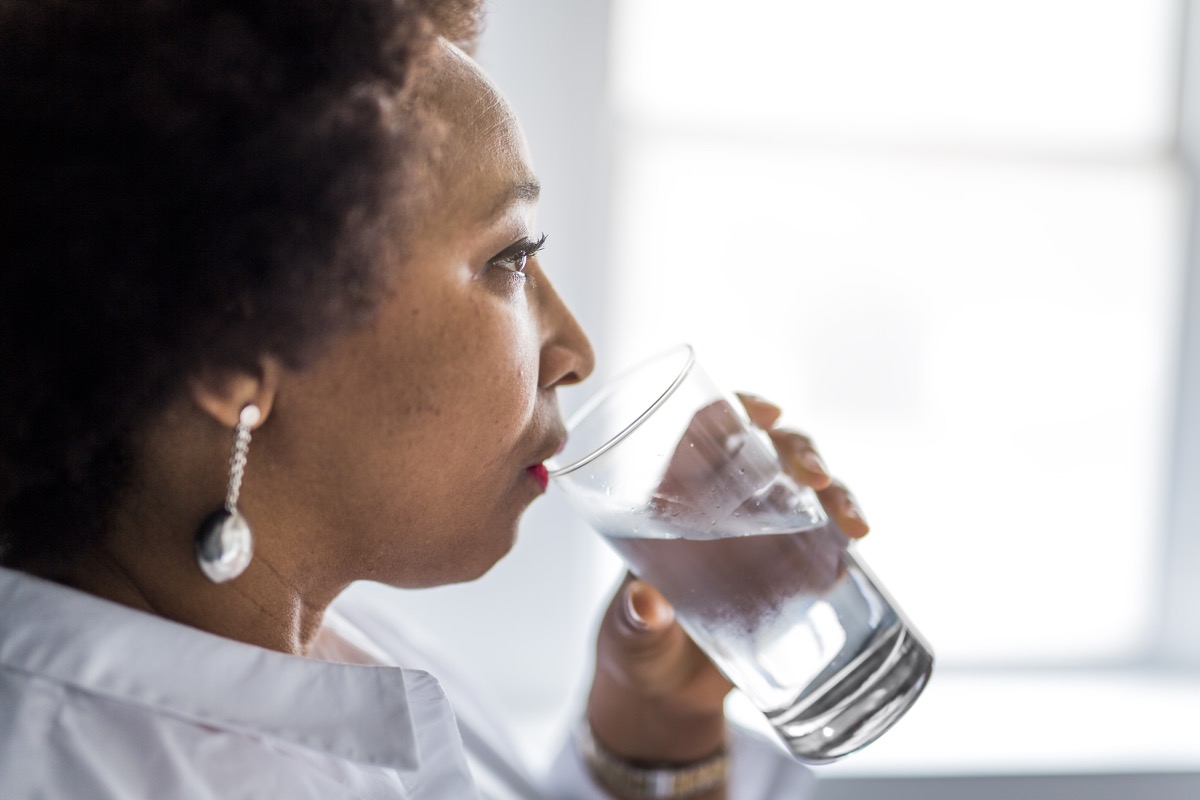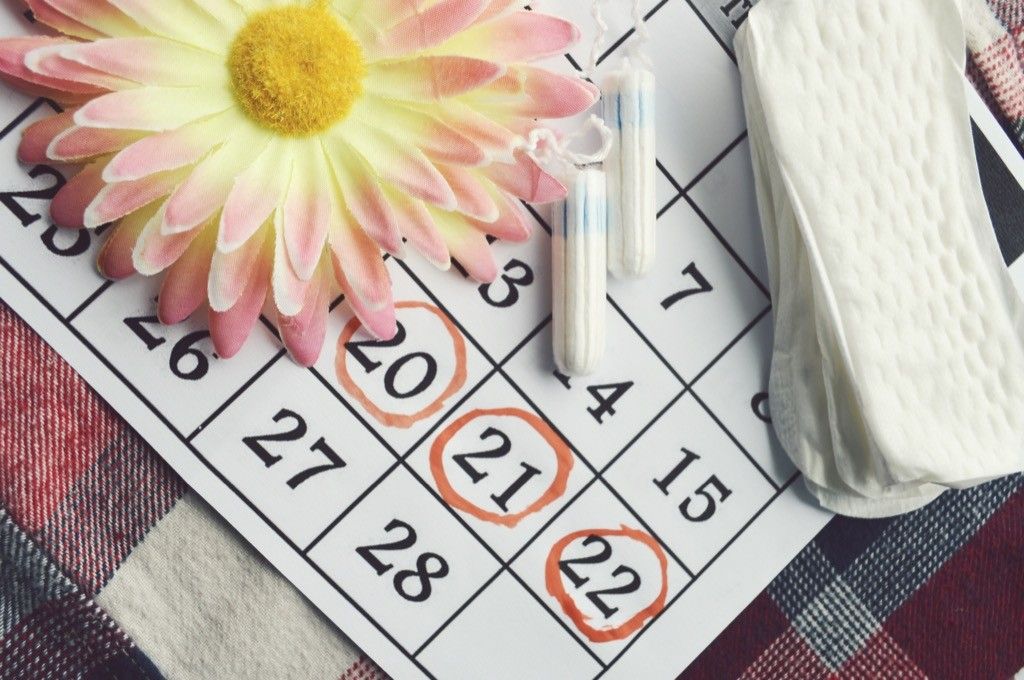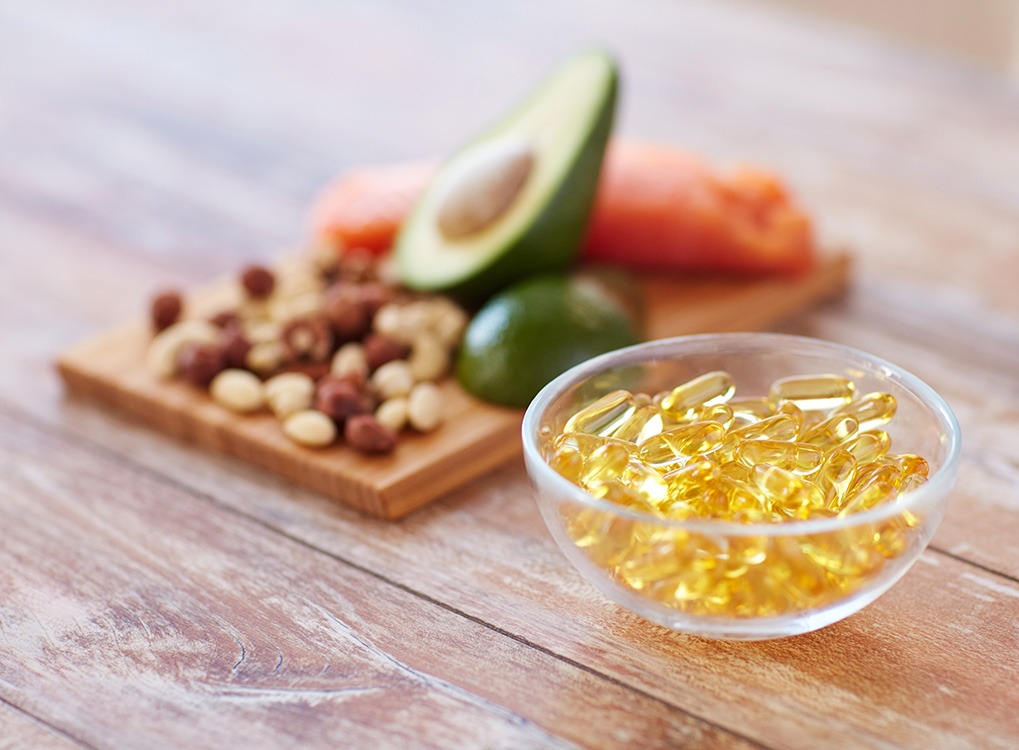Sleep apnea is incredibly common—especially in those who are middle-aged, according to the Division of Sleep Medicine at Harvard Medical School. As you go through your 40s, your risk only grows—and, in turn, that could increase your risk of everything from heart disease to teeth issues. When you have an increased occurrence of sleep apnea, “the jaw begins to move forward in order to acquire more air, which is exhibited by teeth grinding,” says Inna Chern, DDS, of New York General Dentistry. If you wake up with a tired jaw or sensitive teeth, you might want to wear dental guards to bed and address the problem with your dentist. And for things you’ve been told about your health that aren’t really true, check out 30 Worst Women’s Health Myths That Won’t Die.
As you age, your metabolism starts to slow down. That means you probably can’t get away with some of the habits you had in your 20s and 30s. To help rev it back up, the Cleveland Clinic recommends adding resistance training to your workout routine, loading up on protein, adding spicy foods to your diet, doing aerobic activity, and avoiding saturated fats. “Maintaining a healthy weight—a BMI under 25—eating a plant-rich diet, and exercising reduces your risk of cancer, cardiovascular disease, type 2 diabetes, and even depression,” says Nancy Elliott, MD, a breast surgeon at Montclair Breast Center in New Jersey. “The ‘side effects’ of a healthy lifestyle include a better immune system and a better disposition. With those kinds of benefits, it’s a win-win for everyone, regardless of their risk status.” And for ways you can shed those extra pounds healthily, check out 101 Ultimate Weight Loss Tips for Summer 2020.
Your mouth has felt much drier than usual, so what gives? “As we age, we produce less saliva, and due to certain illnesses, we are taking more systematic medications. Many medications list side effects, which include dry mouth, better known as xerostomia,” Chern says. “That dry mouth, in turn, may lead to a spike in cavities because there isn’t enough salivary flow to bathe the teeth and remove cavity-causing bacteria.” And for health issues that may arise as you age, regardless of your gender, check out 40 Signs of Poor Health No One Over 40 Should Ignore. According to UnityPoint Health, your peak bone mass—when your bones are at their maximum density and strength—starts to decline in your 40s. Since that can put you at risk of osteoporosis, make sure you’re getting adequate amounts of calcium, vitamin D, and regular exercise.
If you’ve noticed a change in your vision, that’s normal: According to the American Optometric Association, it typically becomes harder to see things clearly at close distances beginning in your early- to mid-40s, and that might mean it’s time to visit the eye doctor to get some glasses or contacts. You might also need more light to see than you used to, have problems with glares while driving, and experience changes in seeing colors.
If you don’t want to rock a pair of dentures in the future, don’t skimp out on your oral hygiene now. That means continuing to floss daily, even though it’s a pain. “‘Brush and floss when you’re young and you’ll keep your teeth when you’re old’ is my favorite quote,” says Sonya Krasilnikov, DDS, co-founder and cosmetic general dentist at Dental House in New York City. And for more helpful information, sign up for our daily newsletter. Once you enter your 40s, it might be harder for you to keep your pearly whites, well, white. Sure, their darkening hue could be to drinking too much coffee, but it’s also just something that gets worse with age. “Women over 40 should know they may notice their teeth are getting darker due to stains and life habits. As we age, the cumulative force on the teeth causes the core (pulp) to go lower into the tooth (recede), giving the appearance of grayer teeth,” says Chern. “In conjunction with eating or drinking foods and beverages that stain teeth—including wine, certain pigmented foods, and soda—and smoking, the teeth may also appear yellower as those stains accumulate in the pores of the teeth and stain the inner layer of dentin.“ae0fcc31ae342fd3a1346ebb1f342fcb
Gum disease, or periodontitis, often comes about from poor oral hygiene and can lead to tooth loss. Unfortunately, as you age, your risk for it increases all because of your changing hormones. “Women over 40 should know that hormone fluctuations revolving around peri-menopause may make you more vulnerable to gum disease,” Chern says. “As the hormones progesterone and estrogen teeter-totter in our 40s, they affect the blood supply to the gum tissue and increase the inflammatory reaction to the bacteria-ridden plaque on the teeth. Increased inflammation is a key contributor to gingivitis and periodontitis.” “Women over 40 should know they are at greater risk of grinding or clenching, which can both damage tooth enamel and cause loss of oral volume and attachment around the teeth,” Chern says. “The para-functional habits may be due to increased stress, anxiety, and depression, which all increase around hormonal fluctuations due to peri-menopause or menopause.” Yes, those hormonal changes even cause issues with your teeth. Throughout your 20s and 30s, stress was a given. Whether it was due to your career, your relationship, or raising a family, you probably got used to feeling a bit frazzled. Now, make sure you’re taking the time to combat that pent-up tension—otherwise, you’ll really feel it down the road. “Many people in their 40s reach the peak of their career, and with managerial roles come long hours at the office and a significant increase in stress,” Krasilnikov says. “Stress typically leads to bruxism, a condition in which one unconsciously clenches and grinds their teeth. This will lead to wear of the enamel, sensitivity, jaw pain, and headaches.”
When you’re super busy, some of your healthy habits—whether that’s exercising, meditating, or cooking a healthy homemade meal—can be put on the back burner. But, as Krasilnikov explains, that’s something you want to avoid at all costs. Not only do these healthy habits help you live a longer, happier life, but they also serve as a great learning lesson for your kids, if you have them. “Forty is the new 30 and more and more people are having children into their 40s. With young children comes more stress and less time for healthy habits and doctors visits,” Krasilnikov says. “Remember that children learn best by example, so show them how important it is for you to brush and floss and that will instill good habits in them for life.”
Throughout your 20s and 30s, you might’ve tended to put everyone else first: your significant other, your children, your boss, your friends—the list goes on and on. But now that you’re in your 40s, it’s time to focus on your own well-being in order to live a long and happy life. “Most of us have gotten really good at putting others’ needs, wants, and desires before our own, often leaving us feeling exhausted, overwhelmed, and even worse, resentful,” says Keira L. Barr, MD, founder and chief wellness officer of the Resilient Health Institute in Gig Harbor, Washington. “Set your boundaries without apologies and respect them so that others respect them, too. Creating boundaries actually frees up your energy—mentally and physically—so you have the time and bandwidth to connect to the things and people you love.”
Nope, it isn’t a magic trick. As you age, your smile really does start to disappear. “Women over 40 should know they may notice a ‘disappearing smile,’” says Chern. “As we age, the upper teeth may appear to disappear or look shorter than they did when we were in our 20s. This is due to the aging of the musculature of the lip, which no longer has the same mobility and volume due to the wearing away of the enamel caused by grinding and clenching.” A daily goal of 10,000 steps has been the go-to recommendation if you want to better your health; but even a moderate goal can make a difference. One 2019 study published in JAMA Internal Medicine found that women who took just 4,400 steps a day had a 41 percent lower mortality rate than those who took 2,700. So put on those sneakers and get to walking—you can reach that 4,400 goal simply by moving around your office.
Think you got your skin problems out of the way in high school? A reality check might be on its way. “Adult acne is among common concerns for women in their 40s and is caused by hormonal changes,” says Inna Knyazevych, an esthetician at In-Glow Med Spa in New York City. Fortunately, there are treatments available. “It can be treated with prescription medications or a proper combination of daily care and professional skin clearing treatments,” she says. “Because the skin in your 40s can also become dehydrated, focus on products that contain probiotics and willow bark. They’re naturally gentler and help prevent any over-drying from happening, unlike some of the popular products with salicylic acids and benzoyl peroxide.”
Nope, it’s not just men who experience hair loss as they age—it’s women, too, all thanks to the changes in your hormones. “A drop in estrogen could be responsible for hair loss,” Knyazevych says. And on the other end of the spectrum, women over 40 could also experience hair popping up in places they’ve never had it before. “Increased levels of testosterone contribute to unwanted hair growth on the face and body,” Knyazevych adds. “Both affect our self-esteem and confidence, but can be fixed with the right treatments.” It seems like your changing hormones in your 40s take a toll on everything. Aside from messing with your hair, they can also affect your mouth. “Forty is the age some women start experiencing hormonal changes, and because the oral mucosa contains estrogen receptors, changes in hormone levels directly affect the oral cavity,” says Krasilnikov. “These changes can include dry mouth, burning mouth syndrome, caries, periodontal disease, and taste changes. Those are all symptoms that should be evaluated by your doctor and dentist.”
At this point, you’ve probably never even thought about how dense your breasts are. But according to Elliot, that’s something you’ll want to be familiar with. In fact, it could even save your life. “Forty percent of women have dense breasts—something that’s determined not by how breasts look or feel, but by evaluating tissue via mammography,” says Elliott. “Women with dense breasts are typically candidates for supplementary testing, such as MRI, which is a much more sensitive test.”
If you’re not already giving yourself a breast massage on the daily, pop it on your schedule just like you do all the other important things in your life. “I recommend doing a daily breast massage. You should know your body better than anyone else,” Elliott says. “Does anything seem unusual? Does anything look or feel different? Stimulate your lymphatic system! Don’t think of it as ‘checking for cancer’—think of it as part of your daily wellness routine, just like brushing your teeth.”
Beginning at age 40, the Mayo Clinic recommends getting yearly mammograms to detect any breast abnormalities. Nope, they’re not fun, but sticking to a schedule can keep you healthy. “We want to avoid toxic treatments with a lifetime of side effects, such as chemotherapy. The best way to do that is to catch cancer at the earliest stage possible: Stage 0, Stage 1, or Stage 2,” Elliott says. “Fifty percent of the cancers we find are actually Stage 0, which is a non-invasive cancer where abnormal cells have not spread outside of the ducts or lobules into the surrounding breast tissue. These women are often able to treat their problem with a lumpectomy and a five-year prescription that can be scheduled a week after diagnosis. It’s a significant difference.” In order to make sure you’re getting the best possible mammogram, it’s a good idea to make sure the office you’re going to has the best equipment for the job. “A facility that’s still using 2D mammography is, quite frankly, not using the best technology available,” says Elliott. “3D mammography paired with a breast specialist increases your chance of detecting breast cancer at its earliest and most treatable stage.”
“Every woman should know her family history of cancer, and she should share this information with her breast specialist in order to determine if she is a candidate for genetic testing,” Elliott says. “Most insurance will pay for genetic testing if you meet nationally recognized guidelines, but you need to know your family history (maternal and paternal) to see if that is an option for you.”
While your general family history is important, so is knowing your particular lifetime risk of breast cancer, says Elliott. “Hereditary breast or ovarian cancer is most commonly caused by mutations of either the BRCA1 or BRCA2 genes. These mutations greatly increase a woman’s risk for breast, ovarian, pancreatic, melanoma, and possibly other cancers,” she explains. “A quality breast center will be able to determine a lifetime risk score, which will impact whether or not you are a candidate for MRI—one of the most sensitive tests available.”
Your peak reproductive years are in your 20s—so if you want to get pregnant in your 40s, make sure you do so as early in the decade as possible. “Fertility declines as a woman matures, with gradual decline beginning in the mid-30s,” says Adeeti Gupta, MD, founder of Walk-In GYN Care in New York City. “Fertility after the age of 43 declines significantly.” Along with a decline in your fertility also comes an increased chance of something going wrong if you do get pregnant. “Women are born with a fixed number of oocytes, which declines with age. The quality of eggs also declines with age because of a higher risk of chromosomal errors,” says Gupta. “This can result in an increased risk of miscarriage … In addition to the accumulation of genetic errors in the egg pool over time, other factors such as smoking, other environmental exposures, and certain medical and surgical treatments can compromise egg quality, ovarian reserve, and the chance for a healthy outcome for pregnancy as women age.”
In the past, you probably had an OB-GYN appointment once a year. In your 40s, you might want to schedule appointments a little more often to check certain symptoms that tend to crop up. “In your 40s, some conditions women find more prevalent include endometriosis, fibroids, irregular bleeding, heavy periods, and peri-menopausal symptoms,” says Gupta. If your sex drive has been pretty much non-existent lately, it’s not you—it’s your age. “Decreased libido can hit some women in their 40s hard and affect their relationships and self-esteem,” Gupta says. “Testosterone levels start to decline and if women don’t keep up with mental and physical fitness, they may start seeing the effects creep into their sexual health as well.”
Low libido isn’t the only problem a change in your hormones can cause in your 40s. It can also lead to vaginal dryness, which becomes even more common after menopause, according to Harvard Medical School. You don’t have to suffer through the pain, though. Talk to your doctor to find a solution that can help you feel back to normal again.
You’re not safe from bloating at any age, but your fluctuating hormones in your 40s could cause it to happen a lot more often. Luckily, there are things that can help with the problem. “Water retention and bloating cause a lot of discomfort,” says Knyazevych. “Not many people are aware of the power of lymphatic drainage. Endermologie—a treatment that deeply massages the body tissue—does wonders.”
When you were younger, you might’ve skipped the doctor even if you were experiencing something odd. But now that you’re in your 40s, you should probably schedule an appointment anytime something out of the ordinary pops up. “While not every symptom requires immediate attention, if something is lingering, growing, itching, or bleeding, make an appointment to have it formally evaluated by a doctor,” says Barr.
You know how a bruise tells you that you knocked into something a little too hard? Well, that’s not the only message your skin is sending as you age. “As your largest organ, your skin is a true window to and reflection of your overall state of health and well-being,” Barr says. “When you see things on your skin, they’re clues to something happening deeper in your body and they can give you a lot of information about what that might be. And if you can tune in to what your skin is trying to tell you, you can take action to nourish it to look better, feel better, and become more confident in the skin you’re in.” According to Barr, skin cancer is the most common cancer worldwide, with more new cases each year than all other cancers combined. Because of that, she says it’s incredibly important to not only get skin exams done by your doctor, but also do them yourself regularly. “Check yourself for any new spots that stand out from all of your others, or existing spots that have grown, changed, or are consistently itching or bleeding,” she says. “Simply by checking your skin, you have the ability to save your own life.”
Those light, easy periods of your youth might come to a halt once you reach your 40s. Instead, you could be left dealing with a barrage of issues you didn’t previously have on both sides of the spectrum. “When a woman turns 40, estrogen and progesterone surges become shorter, and in some cases higher. That means your periods can become closer together and heavier,” Gupta says. “For some women, as they get closer to menopause, the surges can become fewer and far between leading to scantier, lighter periods and skipped periods.”
As you age, it’s easy to get caught up in what other people say is best for “someone your age.” In reality, the only person who knows what’s best for you is you (and your doctor, of course). “Tune into your body and be mindful of how it responds to your diet, lifestyle, and environmental exposures,” says Barr. “That’s what matters most for optimizing your health.” According to Elliott, one of the best things you can do in your 40s is to be more demanding of your healthcare providers—and never feel bad about it. “Women should be empowered with the most accurate and thorough information available, which includes a precise reading on her medical images,” Elliott says. “Women should demand to have their results immediately and meet with their radiologist. Women need to be an advocate for their health. A quality facility should be able to accommodate these reasonable requests.”
Sometimes it can feel like you have no control over any health issues that might pop up, but that’s the furthest thing from the truth. “You have control over your health,” Elliott says. “While some risk factors for disease are unavoidable—including your family history and ethnicity—there are things you can change to reduce your risks.” Getting enough omega-3 fatty acids—like from chia seeds, nuts, and spirulina—isn’t just crucial for keeping your skin glowing. They also help fight off the health issues that often come about with age. “Omega-3s play an important role in supporting a healthy immune response. Many chronic diseases are rooted in inflammation, and reducing this inflammatory process may help prevent numerous conditions and symptoms in the body, including cardiovascular disease,” says Leah Gordon, ND, naturopathic health advisor at Needed. “Omega-3s may be the main factor in preventing other inflammatory conditions such as period pain, joint pain, depression, and menopausal symptoms as women journey into their later decades of life.” According to Barr, your doctor can provide you with all the recommendations, guidelines, and evidence-based treatment recommendations in the world. But the reality? It’s up to you. “At the end of the day, you have to be willing to invest the time, energy, and resources into getting the results you desire,” Barr says. “Set yourself up for success and get intentional about your goals, then start taking one action every day to help achieve them.”
In the past, you might have thought getting a second opinion was a waste of time. But at this stage in your life, don’t be afraid to step up to make sure you’re getting the best possible outcome you can. “Your body. Your life. Your decision,” Barr says. “Depending on the complexity of the problem and your doctor’s area of expertise, insights and treatment recommendations can vary, so don’t be afraid to seek a second opinion so you can feel comfortable and confident in the final decision you make for your health.”








